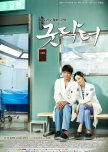A Mixed Bag
This series should rightly be acknowledged for tackling the subject of autism at a time when it was still pretty much a ‘hidden’ neurodivergence. Another plus is that the story is heartwarming, there is a decent character journey and the autistic ML is more than a two-dimensional portrayal.
However, that’s where the positives end. The patients’ stories are often tone deaf in their attempt to portray sentimentality. At times it seemed like they were doing their best approximation of ‘feel good’ stories that inevitably came across as clunky and clumsy. On their portrayal of autism, I can only speak as a non-autistic person and my perspective of this show is through the lens of a neurotypical person. So I am sure there are things that I cannot say subjectively whether they are portrayed well or not.
Still, I think it’s safe to say that the views of autism in this show both sociologically and medically were questionable to say the least. The science just wasn’t science-ing and even the ‘progressive’ views that were supposed to serve as the righteous ‘voice of the show’ made me cringe to know that there was a time that this was the ‘academic’ view of autism in Korea (I’m assuming the creators of this series researched Korean academia regarding autism, but I might be giving them too much credit).
What stuck out to me the most, was the notion that autism could be cured. The excessive use of the words ‘normal’, ‘stupid’, ‘crazy’, ‘mentally weak’ etc, coming from a show representing the medical profession was quite jarring. Surely, even ten years ago Korean doctors weren’t this inept in their understanding of autism, the behaviours associated with autism and whether it was something that could just go away. I expected this from the general public as they are less knowledgeable. If these misinformation were mainly being voiced by the characters that were not doctors, I could understand but the prejudice and pseudoscience was coming mostly from the ‘doctors’. I can just imagine well meaning Korean viewers, with very little knowledge of autism, watching this show in 2013 thinking they were actually learning something and gaining an understanding of autism.
Whether that was more damaging than the positives of having autism representation at the time of this release, is something I cannot say either way. But it’s a good question to ask. Of course, portrayals of people with autism have come leaps and bounds since this series was aired. Extraordinary Attorney Woo and Move To Heaven are two such examples.
However, that’s where the positives end. The patients’ stories are often tone deaf in their attempt to portray sentimentality. At times it seemed like they were doing their best approximation of ‘feel good’ stories that inevitably came across as clunky and clumsy. On their portrayal of autism, I can only speak as a non-autistic person and my perspective of this show is through the lens of a neurotypical person. So I am sure there are things that I cannot say subjectively whether they are portrayed well or not.
Still, I think it’s safe to say that the views of autism in this show both sociologically and medically were questionable to say the least. The science just wasn’t science-ing and even the ‘progressive’ views that were supposed to serve as the righteous ‘voice of the show’ made me cringe to know that there was a time that this was the ‘academic’ view of autism in Korea (I’m assuming the creators of this series researched Korean academia regarding autism, but I might be giving them too much credit).
What stuck out to me the most, was the notion that autism could be cured. The excessive use of the words ‘normal’, ‘stupid’, ‘crazy’, ‘mentally weak’ etc, coming from a show representing the medical profession was quite jarring. Surely, even ten years ago Korean doctors weren’t this inept in their understanding of autism, the behaviours associated with autism and whether it was something that could just go away. I expected this from the general public as they are less knowledgeable. If these misinformation were mainly being voiced by the characters that were not doctors, I could understand but the prejudice and pseudoscience was coming mostly from the ‘doctors’. I can just imagine well meaning Korean viewers, with very little knowledge of autism, watching this show in 2013 thinking they were actually learning something and gaining an understanding of autism.
Whether that was more damaging than the positives of having autism representation at the time of this release, is something I cannot say either way. But it’s a good question to ask. Of course, portrayals of people with autism have come leaps and bounds since this series was aired. Extraordinary Attorney Woo and Move To Heaven are two such examples.
Cet avis était-il utile?


 1
1





















